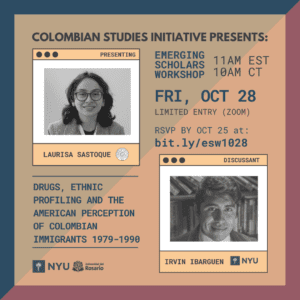Emerging Scholars Workshop: Drugs, Ethnic Profiling and The American Perception of Colombian Immigrants 1979-1990
Friday Oct 28 | 11:00am-12:00pm EST
Register: https://bit.ly/esw1028
We will be discussing the paper titled, “Drugs, Ethnic Profiling and The American Perception of Colombian Immigrants 1979-1990” presented by Northwestern University student, Laurisa Sastoque.
- Presenting: Laurisa Sastoque, B.A, History and Creative Writing at Northwestern University
- Discussant: Irvin Ibarguen, Assistant Professor of History at New York University
Abstract: In July of 1979, the Dadeland Mall Massacre in South Florida marked the start of the “Cocaine Cowboy” era, where Colombians involved in the drug trade received widespread portrayals of violence in American media. As U.S. anti-narcotics efforts concentrated on the seizure of South Florida drug smuggling crafts, drug trafficking routes spread throughout major urban centers, such as New York and Los Angeles. Along with drug trafficking, drug-related violence became a common portrayal of Colombians in U.S. media. This paper analyzes how the media’s portrayal of Colombian drug trafficking turned into a stigma that affected the Colombian community in the United States at large. By reviewing periodical sources between the years 1979-1990, this paper argues that the formation of the drug trafficking stigma stems from the media’s almost exclusive portrayal of Colombians as drug traffickers, within a context of U.S.-Colombia relations that encompassed tensions regarding responsibility for the growing transnational drug problem. Ultimately, this study proves that the drug trafficking stigma for Colombian immigrants is inherently tied to how American society viewed the Colombian government’s actions in the War on Drugs.
